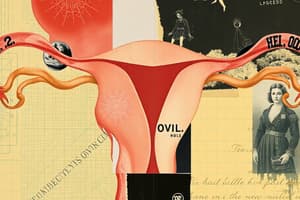Podcast
Questions and Answers
During which phase of the uterine cycle does ovulation occur?
During which phase of the uterine cycle does ovulation occur?
- Proliferative phase (correct)
- Days 7-14
- Secretory phase
- Menses
What triggers the shedding of the uterine lining during menses?
What triggers the shedding of the uterine lining during menses?
- Decrease in estrogen and progesterone (correct)
- Increase in estrogen
- Decrease in LH and FSH
- Increase in LH and FSH
Which hormone is responsible for the development of new follicles in the proliferative phase?
Which hormone is responsible for the development of new follicles in the proliferative phase?
- Progesterone
- LH
- Oxytocin
- FSH (correct)
What happens in the secretory phase of the uterine cycle?
What happens in the secretory phase of the uterine cycle?
If fertilization of the egg doesn't occur, what causes the breakdown of the uterine lining resulting in menstruation?
If fertilization of the egg doesn't occur, what causes the breakdown of the uterine lining resulting in menstruation?
Which phase of the uterine cycle coincides with the luteal phase of the ovarian cycle?
Which phase of the uterine cycle coincides with the luteal phase of the ovarian cycle?
What hormone causes the multiple ovarian follicles to develop during the follicular phase of the ovarian cycle?
What hormone causes the multiple ovarian follicles to develop during the follicular phase of the ovarian cycle?
On which day of the ovarian cycle does ovulation occur?
On which day of the ovarian cycle does ovulation occur?
What causes the corpus luteum to degenerate by apoptosis if fertilization does not occur?
What causes the corpus luteum to degenerate by apoptosis if fertilization does not occur?
During which phase of the ovarian cycle does the dominant follicle push out against the ovary and other follicles degenerate and die off?
During which phase of the ovarian cycle does the dominant follicle push out against the ovary and other follicles degenerate and die off?
What type of cells transform into the corpus luteum after ovulation?
What type of cells transform into the corpus luteum after ovulation?
Which hormone produced by the granulosa cells lowers FSH levels in the ovarian cycle?
Which hormone produced by the granulosa cells lowers FSH levels in the ovarian cycle?
Flashcards
Menses Phase
Menses Phase
The breakdown and shedding of the uterine lining, lasting approximately days 1-7 of the menstrual cycle.
Proliferative Phase
Proliferative Phase
The phase (days 7-14) where estrogen increases, triggering LH and FSH surges and leading up to ovulation.
Secretory Phase
Secretory Phase
The phase where the uterine lining builds up due to increased estrogen and progesterone from the corpus luteum, preparing for potential implantation.
Hormone surge impact
Hormone surge impact
Signup and view all the flashcards
Empty follicle
Empty follicle
Signup and view all the flashcards
Follicular Phase
Follicular Phase
Signup and view all the flashcards
Granulosa cells' role
Granulosa cells' role
Signup and view all the flashcards
FSH Function
FSH Function
Signup and view all the flashcards
Dominant follicle fate
Dominant follicle fate
Signup and view all the flashcards
Ovulation process
Ovulation process
Signup and view all the flashcards
Corpus luteum origin
Corpus luteum origin
Signup and view all the flashcards
Corpus luteum role
Corpus luteum role
Signup and view all the flashcards
Study Notes
Uterine Cycle
- The uterine cycle is part of the menstrual cycle, which lasts around 28 days, but can vary from person to person.
- The cycle can be divided into three phases: menses, proliferative, and secretory.
- Menses (days 1-7) is the breakdown and shedding of the uterine lining due to the drop in estrogen and progesterone levels.
- The proliferative phase (days 7-14) is characterized by an increase in estrogen, triggering a surge of LH and FSH, leading to ovulation.
- Ovulation occurs on day 14, and the follicle that contained the egg becomes the corpus luteum, producing estrogen and progesterone.
Proliferative Phase
- Estrogen increase triggers a surge of LH and FSH, causing ovulation of the secondary oocyte (ovum).
- Without the oocyte, the follicle becomes the corpus luteum, producing estrogen and progesterone.
Secretory Phase
- The increase of estrogen and progesterone from the corpus luteum causes the uterine lining to build up in preparation for implantation.
- If fertilization doesn't occur between days 14-20, the corpus luteum breaks down, leading to a decrease in progesterone and estrogen, and eventually menstruation.
Ovarian Cycle
- The ovarian cycle is part of the menstrual cycle, lasting around 28 days, but can vary from person to person.
- The cycle is divided into two phases: follicular and luteal.
- The follicular phase (days 1-14) is characterized by the development of multiple ovarian follicles and the growth of granulosa cells.
- The granulosa cells produce estrogen, progesterone, and inhibin, causing a rise in hormone levels in the blood.
Follicular Phase
- FSH release by the pituitary gland causes multiple ovarian follicles to develop.
- Granulosa cells grow and produce hormones, causing a surge in LH.
- The dominant follicle will start to push out against the ovary, and the other follicles will degenerate and die off (atresia).
- Ovulation occurs on day 14, when the enzymes within the follicle break down the ovary wall.
Luteal Phase
- After ovulation, the follicle that contained the egg collapses and transforms into the corpus luteum.
- The corpus luteum produces estrogen, progesterone, and inhibin, which lowers FSH levels.
- If fertilization occurs, the corpus luteum continues to produce hormones, maintaining the uterine wall.
Studying That Suits You
Use AI to generate personalized quizzes and flashcards to suit your learning preferences.




